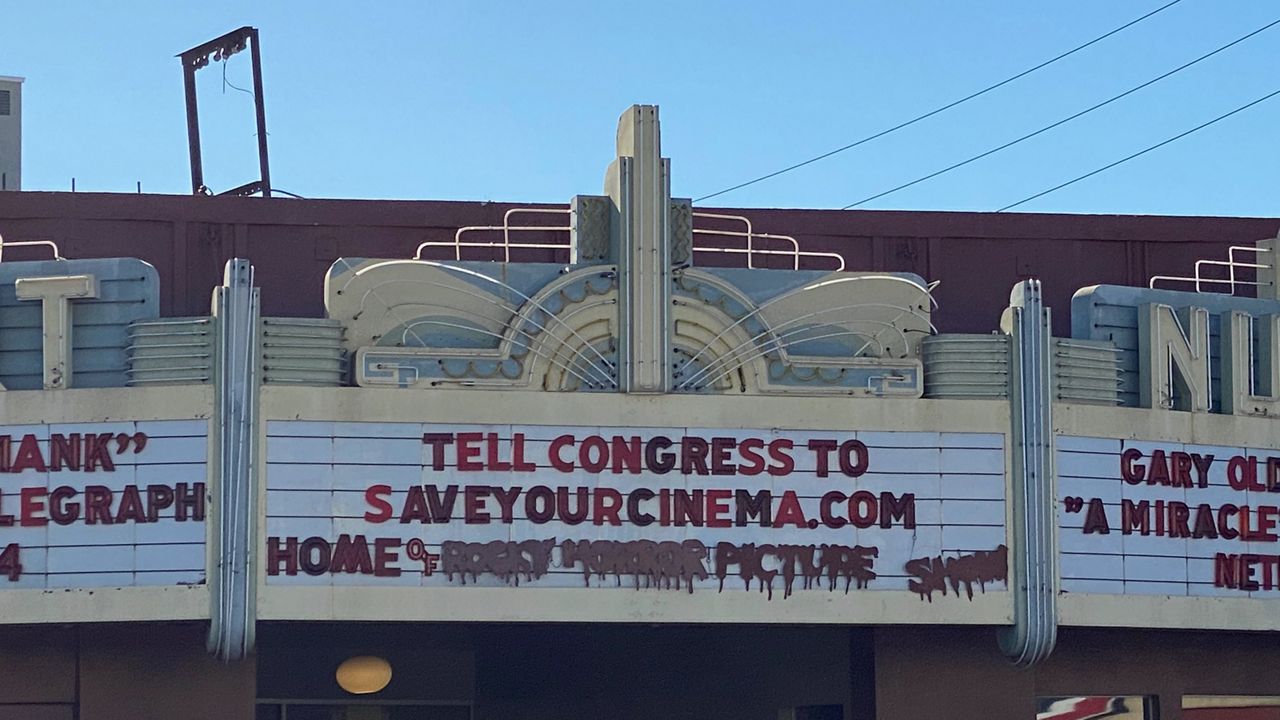CALIFORNIA — When the nationwide promotional campaign for “Cinema Week” launched Tuesday, the underlying message was “we need help.”
Of all the businesses impacted by the pandemic, movie theaters were among the hardest hit. Part-time staff scattered and revenues evaporated. Steady growth in streaming services and an explosion of streamable content worried theater operators that audiences might not return in force.
“We have to all do our part to keep movie theaters alive or they’ll become extinct,” said Margot Gerber, vice president of marketing and publicity for Landmark Theatres.
A growing list of studios has also experimented with their own streaming services. The industry has been increasingly moving toward accessibility and immediacy. The film rental business has already migrated almost entirely to digital platforms, and many worry movie theaters are soon to follow.
That could mark the beginning of the end of the noted historic theaters of Los Angeles, like the iconic Nuart Theatre.
Los Angeles is known for its historic theaters, and Gerber also works with nonprofit groups to keep the independent movie houses and film culture alive.
The national promotional campaign aims to lift all theaters. It was masterminded by Brandon Jones, an industry marketing professional for more than 30 years and founder of FilmFrog.
Jones said he began putting the campaign together in December and has spent the months in between raising money through sponsorships and working with studios to create customized content. That includes trailers for upcoming blockbusters, which thank audiences for attending “Cinema Week.”
Jones said 30,000 screens in North America chose to participate. His firm’s job was to make it easy for the small and mid-sized chains or independent theaters with little or no marketing budget.
While he declined to disclose the total he collected for the campaign, he said it has been enough to help create “a ton of content.”
“It really is an effort to preserve the culture of moviegoing,” Jones said. “Everything you miss about moviegoing is actually going to one. It just can’t be replicated in your house.”
Jones and Gerber are hoping to remind patrons that going to cinemas is a social need. And while attending a film can vary in cost, it’s often well within the budget of most Americans.
Movie theaters have struggled to adjust to the change in how content is consumed. Content has never been so accessible and customizable with subscription offerings that span movies, TV shows and sports. And customers can view them on almost any device.
That means cinemas may have to tweak the experience they offer. Most movie theaters are already stuck offering fewer concessions because orders were disrupted when attendance stalled. On the one hand, fewer choices can allow for more efficient revenues. Or, it can annoy customers who are used to a broader selection.
Gerber said Landmark’s strategy is to give attendees something they can’t get at home. That usually means independent films that other, larger theater chains may not offer. Landmark also offers question and answer sessions after some showings. But Gerber said the chain is also relying on the idea that the moviegoing experience has an added social bonus people may be especially keen on.
So far, attendance has been strong but not yet back to what it was before the pandemic. Gerber said many of the showings are still well below full capacity, which has made it difficult to staff its Los Angeles locations at typical levels. And some of its locations across the country, like those in Florida, have struggled to find enough staff.
James C. Goss, an industry analyst at Barrington, said movie theaters would benefit from a backlog of blockbusters that have been delayed because of theater closures.
“Now the issue is — is there enough content? Do people want to go back to the theater?” Goss said. “Have they gotten more used to watching streamed content?”
Movie theaters in North America have generally earned about $11 billion annually. Goss thinks the number this year will be about $4 billion and $8 billion next year.
“Cinema Week” represents an innovation in an industry looking for new ways of appealing to audiences.
“It is a precarious business,” Gerber said. “It has been for a while.”



